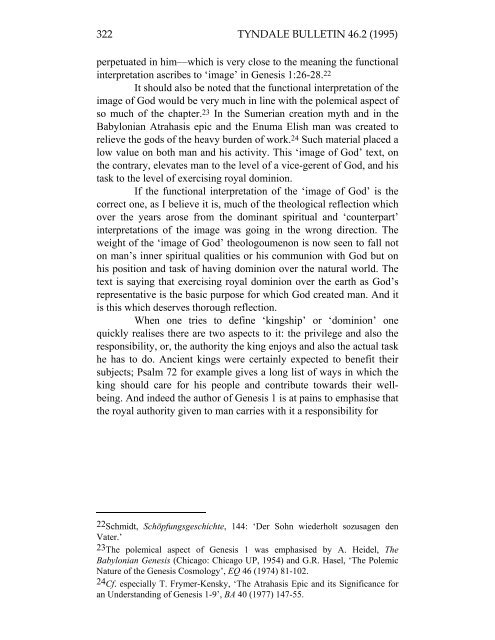GENESIS 1:1-2:3 AS A PROLOGUE TO THE BOOK ... - Tyndale House
GENESIS 1:1-2:3 AS A PROLOGUE TO THE BOOK ... - Tyndale House
GENESIS 1:1-2:3 AS A PROLOGUE TO THE BOOK ... - Tyndale House
Create successful ePaper yourself
Turn your PDF publications into a flip-book with our unique Google optimized e-Paper software.
322 TYNDALE BULLETIN 46.2 (1995)<br />
perpetuated in him—which is very close to the meaning the functional<br />
interpretation ascribes to ‘image’ in Genesis 1:26-28. 22<br />
It should also be noted that the functional interpretation of the<br />
image of God would be very much in line with the polemical aspect of<br />
so much of the chapter. 23 In the Sumerian creation myth and in the<br />
Babylonian Atrahasis epic and the Enuma Elish man was created to<br />
relieve the gods of the heavy burden of work. 24 Such material placed a<br />
low value on both man and his activity. This ‘image of God’ text, on<br />
the contrary, elevates man to the level of a vice-gerent of God, and his<br />
task to the level of exercising royal dominion.<br />
If the functional interpretation of the ‘image of God’ is the<br />
correct one, as I believe it is, much of the theological reflection which<br />
over the years arose from the dominant spiritual and ‘counterpart’<br />
interpretations of the image was going in the wrong direction. The<br />
weight of the ‘image of God’ theologoumenon is now seen to fall not<br />
on man’s inner spiritual qualities or his communion with God but on<br />
his position and task of having dominion over the natural world. The<br />
text is saying that exercising royal dominion over the earth as God’s<br />
representative is the basic purpose for which God created man. And it<br />
is this which deserves thorough reflection.<br />
When one tries to define ‘kingship’ or ‘dominion’ one<br />
quickly realises there are two aspects to it: the privilege and also the<br />
responsibility, or, the authority the king enjoys and also the actual task<br />
he has to do. Ancient kings were certainly expected to benefit their<br />
subjects; Psalm 72 for example gives a long list of ways in which the<br />
king should care for his people and contribute towards their wellbeing.<br />
And indeed the author of Genesis 1 is at pains to emphasise that<br />
the royal authority given to man carries with it a responsibility for<br />
22Schmidt, Schöpfungsgeschichte, 144: ‘Der Sohn wiederholt sozusagen den<br />
Vater.’<br />
23The polemical aspect of Genesis 1 was emphasised by A. Heidel, The<br />
Babylonian Genesis (Chicago: Chicago UP, 1954) and G.R. Hasel, ‘The Polemic<br />
Nature of the Genesis Cosmology’, EQ 46 (1974) 81-102.<br />
24Cf. especially T. Frymer-Kensky, ‘The Atrahasis Epic and its Significance for<br />
an Understanding of Genesis 1-9’, BA 40 (1977) 147-55.

















